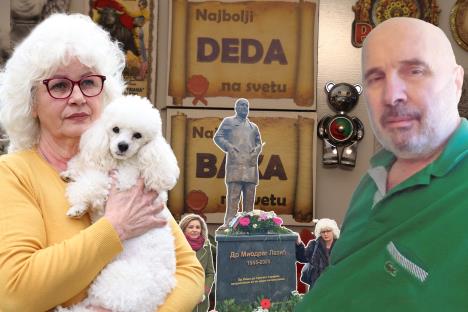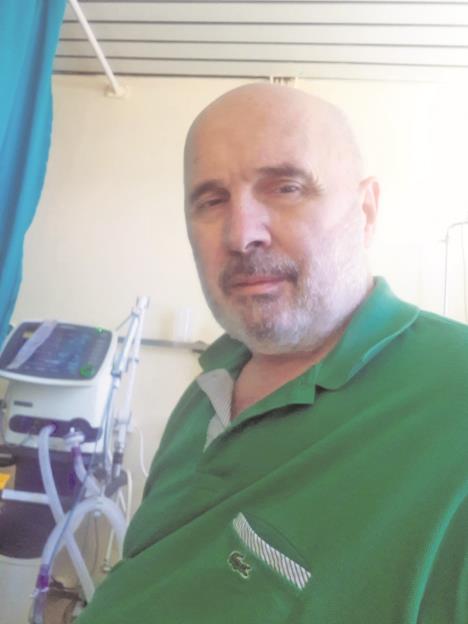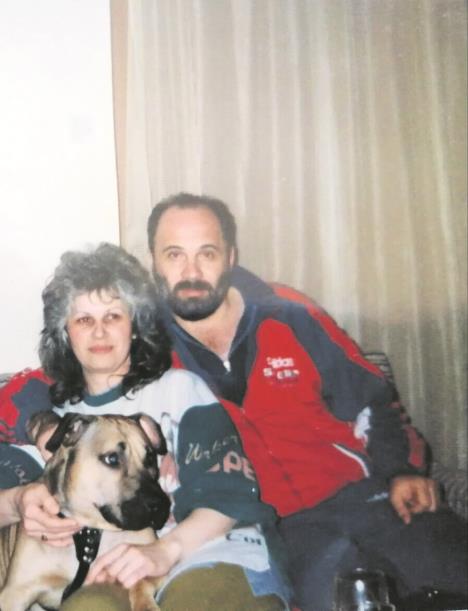TO FULFIL HIS WISH EVEN IN DEATH...’The story of the famous Doctor Laza's widow: He WROTE A FAREWELL MESSAGE during his last shift

"Please, don't go to work. If you go, it's over. You know how you fared with that pneumonia, you know what will happen with the coronavirus," I told him, but no one could stop him: ‘I have to. Can you imagine me sitting at home while there's chaos with patients?’ It's been four years since he's been gone. And everything is getting worse and worse; I still flinch when the phone rings," begins the exclusive story for Kurir by Ana Lazić, the widow of the renowned war surgeon and volunteer, Dr Miodrag Lazić, known as Doctor Laza to everyone, who had only two months left until retirement but decided to enter the red zone despite all his ailments. There, he lost the most important battle - for his life.

Doctor Laza is synonymous with all those honourable healthcare workers we must never forget, those who gave their lives to save others, many of us. They didn't run away, they didn't hide behind fake sick leaves and various excuses. According to the list of the Union of Serbian Doctors and Pharmacists, 146 of them have died from COVID. Truth be told, there are also those who were retired and didn't work. But most of them sacrificed their lives for us. On the front lines for us. Where Doctor Laza had always been. And on the fourth anniversary of the first registered COVID case in Serbia, through the story with Doctor Laza's widow, an anaesthesiologist, we pay tribute to all those who are no longer with us.

He volunteered to go to Krajina in 1991 to save the wounded. His young children left at home. He traversed the famous corridor in 1992, then found himself in Pale, from where he descended straight into the ninth circle of hell - Ilidža. He awaited retirement as Director of the Emergency Care Centre at the Niš Medical Centre He looked forward to it because he would be with his beloved Sarajevo girl, where his heart remained - in Ilidža.
We pass by the Medical Centre. After circling half of Niš with bad navigation to find Gabrovac. Ana stands alone in the huge house. In front of plaster figurines of dogs and cats.



"Laza loved animals," she says.
The concertina door to the basement is half open. It's only when you approach, on the left side, on the polished glass of the door, you see a framed death notice. Blue. It's been there since April 14, 2020.
We go upstairs. A poodle rushes out.
"He always said we'd get a white poodle when he retired. We'd had enough big dogs, now we'd have a small poodle so we can take her everywhere. He planned for us to move to Ilidža, which he loves immensely," Ana tells us, as Laki jumps into her arms:
"My daughter bought it for me while I was in the hospital in Belgrade because of COVID, right after Laza died. To fulfil his wish even in death. And I named her Laki after him. We're inseparable."
From the entrance, the gaze goes straight to a large picture at the bottom.
"That's what Darija, my daughter, gave us for our 20th wedding anniversary. That picture is also on the tombstone."
To the right, there's a two-seat sofa where he always lay. In front of a huge TV. Pictures everywhere, weddings, celebrations, icons, on the fridge a magnet that says, "Best Grandpa."

"He could have stopped working during the pandemic because he was supposed to turn 65 on May 31 and retire. He didn't want to. He was on some task force. We were sitting here, having lunch, it was March 30th or 31st, I'm not sure, when I told him: 'Please, don't go to work. You know what will happen.' 'Just this one last shift, and I won't go anymore.' I come down from upstairs at four in the morning, find him here, in the living room. He couldn't even finish that shift; the fever knocked him down," Ana tells us, saying that her back was stiff, so she didn't work, but they usually worked together in Emergency Care.
During that shift, he writes the famous farewell message: "I have left honourably and honestly. Everyone told me to stay away, but I would never forgive myself for that...," apparently aware that he had no chance against COVID. She didn’t know that then. She would only find out after his death.
Unfortunately, he had a foundation on which COVID easily "found its way." Not so young anymore and on top of that...
"He got bronchitis during the war, developed chronic obstructive pulmonary disease. But nothing alarming. He used the inhaler from time to time. Two years before COVID, he noticed his sugar was rising a bit, but he managed it with diet. However, a year before COVID, he barely survived pneumonia; he was also in the hospital," Ana recalls.
He's positive, temperature rising, refuses to go to the hospital. Ana, on the advice of her daughter from Belgrade, who graduated from medical school, takes medication, antibiotics, according to the COVID treatment protocol. In vain.
“After two days, I managed to convince him, but I also went with him to the hospital. We were promised that they would accommodate us together. An old building of the internal clinic, four beds and two men close to exhaustion. Dirty, no light in the toilet, cold... He had a nervous breakdown that night, and in the morning he said: "Pack up, we're going home. If I have to die, I want to die in my bed, not in this filth." He cursed everything at the Medical Centre. The on-duty doctor did all the tests for us, and we returned home by ambulance. As I locked the gate, he leaned against the concertina door, started to fall, I barely caught him, washed his face to bring him to his senses,” she says.

Meanwhile, she says, her temperature also rises, but she doesn't tell him:
“We were attached like Siamese twins. He always feared that I would get sick, that something would happen to me.”
After three days, the saturation drops, he agrees to go to the Infectious Diseases Clinic if she stays home to rest a bit.
“I saw him off at 10 PM, and he kept calling from the Infectious Diseases Clinic to see how I was. ‘Fine, fine.’ However, I'm getting worse, I end up at the Infectious Diseases Clinic, and then, as a milder patient, they send me to Čair. We were constantly in touch. He arranges to get transferred to the intensive Care Unit, to his building, where we had worked for so many years. I talk to my colleagues, he gets a little better, then worse, and back again,” she says while browsing through numerous photos on her phone, including those of the monitors he had been connected to, because he had to send her everything to make sure he was okay.



“And on April 10th he tells me: ‘I'm feeling really bad, I can't do without oxygen. As soon as I take off the mask, the saturation drops. I will ask them to put me on a ventilator.’ He became claustrophobic in the war, he couldn't wear a mask. Then I understood what the situation was. In the afternoon, we talked again, and around half past nine in the evening, he just said to me: ‘Take care, take care, take care!’ That's the last time I heard from him. He never called me again. Never.”
She then called everyone in turn, but no one answered.
“Around five in the morning, Nurse Mirela called and told me he had passed away. And that's where I lost track. I don't remember anything until I arrived in Belgrade, where they transferred me at the insistence of my daughter. I didn't even attend the funeral.”
She immediately retired. She only had to go to the Emergency Unit when they were installing the memorial plaque. She barely survived. He was gone. She will never set foot there again.
“Every Saturday, when I'm not with one of my daughters taking care of the grandchildren, I go to the cemetery. And every time Laza gets 10 red roses. When Senka, his mother, an exceptional woman, had died, we went to the cemetery, and he said he would take a rose; and I told him to take 10. He used to say: ‘Will you bring me 10 roses?’ And I said, ‘You're crazy, what are you talking about...’ I bring him 10 roses. And I sit there for two or three hours. I bring coffee, a cigarette, and we talk and talk...
“About everything, including the war years.” Because, although it was, as she says, a Siamese-twins sort of attachment, it wasn't love at first sight. Not even close. When they met in September 1992 at the newly established hospital Žice in Balužje, Ilidža.
“We didn't get along for the first twenty days. He thought I was too serious, conceited, while he was arrogant to me. Everyone was afraid to work with him because he was a perfectionist. And if something didn't go right, he immediately yelled, threw things. But after the surgery, he was great. However, I was the only one who didn't stress out. At any moment, I could die, grenades everywhere, and I'm supposed to stress out because of some surgeon?” she says, adding:
“My back starts to hurt, I lean back to straighten it, and he sits behind me to press me a little. I ask him: ‘What are you doing here?!’ That's when we started to talk normally. And we'd never been apart since. Not a single day. It was really pathological love. When he's on call or goes to town, I pick up the phone to call him, and at the same time, my phone rings - it's him. Telepathy. We watched TV Puzzles even down there, during the war, when we had the opportunity, if there was no work. And that stuck with us. When we came to Niš, we never missed one. If he's on call, he calls me, and we solve them together over the phone.”
She even saved his life, as it happens.
“It was 1994 when we were shelled. They targeted the hospital, there was nothing next to it, only churches. We had a habit that if there was no work and it was quiet, everyone would drink coffee at 12 o'clock in the room where he stayed. That day around half-past 11, he wants to go to the canteen next to the hospital, that's where the fighters gathered. I said to him, ‘You'll go after we drink coffee.’ I meant, better to have it now so there's no work later. We were in the hallway, and I said, ‘You go put the kettle on, and I'll go call the colleagues.’ And as soon as we turned our backs, the bombs started falling. Chaos. In the canteen – men, women, and children were killed... Glass everywhere, wounded, dead people. When it all ended, he said, ‘You saved my life. If you hadn't stopped me, I would have died in the canteen.’ “
They don't have any pictures together from the war. It wasn't something they thought of. But they have some from 1996, when they came to Niš. And 1997, when they got married. Framed. Second marriage for both of them. Two children each.
“We were together for a full 29 years. Now, I live from memories. But again, I say, ‘I'm happy I was able to spend my life with him...’ "
In accordance with the WMG Terms of Use and the Law on Public Information and Media, unauthorized copying of part or all of the text and/or media without indicating and linking the source and author and is prohibited.
Jelena S. Spasić

Bonus video:









